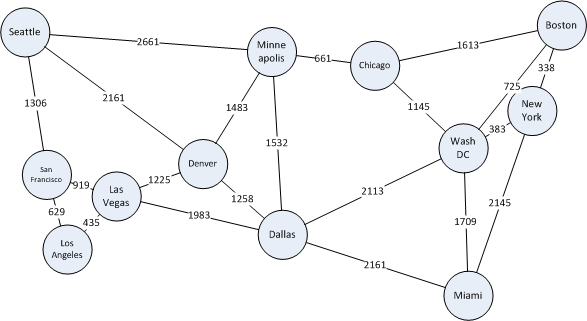2. Ejemplos del Internet¶
Ejemplo de Hanoslav
pgRouting puede resolver el problema de ejemplo como el que se muestra a continuación (picture from hanoslav.net)

SET client_min_messages TO WARNING;
DROP TABLE IF EXISTS table1_vertices;
CREATE TABLE table1_vertices (
vid SERIAL PRIMARY KEY,
name TEXT
);
DROP TABLE IF EXISTS table1;
CREATE TABLE table1 (
id SERIAL,
source INTEGER REFERENCES table1_vertices(vid),
target INTEGER REFERENCES table1_vertices(vid),
cost FLOAT
);
INSERT INTO table1_vertices (name) VALUES ('Seatle');
INSERT INTO table1_vertices (name) VALUES ('San Francisco');
INSERT INTO table1_vertices (name) VALUES ('Las Vegas');
INSERT INTO table1_vertices (name) VALUES ('Los Angeles');
INSERT INTO table1_vertices (name) VALUES ('Denver');
INSERT INTO table1_vertices (name) VALUES ('Minneapolis');
INSERT INTO table1_vertices (name) VALUES ('Dallas');
INSERT INTO table1_vertices (name) VALUES ('Chicago');
INSERT INTO table1_vertices (name) VALUES ('Washington D.C.');
INSERT INTO table1_vertices (name) VALUES ('Boston');
INSERT INTO table1_vertices (name) VALUES ('Nueva York');
INSERT INTO table1_vertices (name) VALUES ('Miami');
INSERT INTO table1 (source, target, cost) VALUES ( 1, 2, 1306);
INSERT INTO table1 (source, target, cost) VALUES ( 1, 5, 2161);
INSERT INTO table1 (source, target, cost) VALUES ( 1, 6, 2661);
INSERT INTO table1 (source, target, cost) VALUES ( 2, 3, 919);
INSERT INTO table1 (source, target, cost) VALUES ( 2, 4, 629);
INSERT INTO table1 (source, target, cost) VALUES ( 3, 4, 435);
INSERT INTO table1 (source, target, cost) VALUES ( 3, 5, 1225);
INSERT INTO table1 (source, target, cost) VALUES ( 3, 7, 1983);
INSERT INTO table1 (source, target, cost) VALUES ( 5, 6, 1483);
INSERT INTO table1 (source, target, cost) VALUES ( 5, 7, 1258);
INSERT INTO table1 (source, target, cost) VALUES ( 6, 7, 1532);
INSERT INTO table1 (source, target, cost) VALUES ( 6, 8, 661);
INSERT INTO table1 (source, target, cost) VALUES ( 7, 9, 2113);
INSERT INTO table1 (source, target, cost) VALUES ( 7, 12, 2161);
INSERT INTO table1 (source, target, cost) VALUES ( 8, 9, 1145);
INSERT INTO table1 (source, target, cost) VALUES ( 8, 10, 1613);
INSERT INTO table1 (source, target, cost) VALUES ( 9, 10, 725);
INSERT INTO table1 (source, target, cost) VALUES ( 9, 11, 383);
INSERT INTO table1 (source, target, cost) VALUES ( 9, 12, 1709);
INSERT INTO table1 (source, target, cost) VALUES (10, 11, 338);
INSERT INTO table1 (source, target, cost) VALUES (11, 12, 2145);
SET client_min_messages TO NOTICE;
-- Their output starts with 0 so we subtract 1 to the vid
-- pgrouting: no paths or 0 length (aka I am there, so no path) are not included
SELECT name, cost, agg_cost FROM pgr_dijkstra(
'SELECT id, source, target, cost FROM table1',
1, 6, true)
JOIN table1_vertices ON (node = vid) ORDER BY seq;
SELECT name, cost, agg_cost FROM pgr_dijkstra(
'SELECT id, source, target, cost FROM table1',
1, 11, true)
JOIN table1_vertices ON (node = vid) ORDER BY seq;
select end_vid, array_to_string( array_agg(name ORDER BY seq),','), array_agg(node ORDER BY seq)
FROM pgr_dijkstra(
'SELECT id, source, target, cost FROM table1',
1, ARRAY[1, 2, 3, 4, 5, 6, 7, 8, 9, 10, 11, 12], true)
JOIN table1_vertices ON (node = vid) GROUP BY end_vid;
El código siguiente genera la tabla a continuación.
end_vid | array_to_string | array_agg
---------+-------------------------------------------------------+--------------
2 | Seatle,San Francisco | {1,2}
3 | Seatle,San Francisco,Las Vegas | {1,2,3}
4 | Seatle,San Francisco,Los Angeles | {1,2,4}
5 | Seatle,Denver | {1,5}
6 | Seatle,Minneapolis | {1,6}
7 | Seatle,Denver,Dallas | {1,5,7}
8 | Seatle,Minneapolis,Chicago | {1,6,8}
9 | Seatle,Minneapolis,Chicago,Washington D.C. | {1,6,8,9}
10 | Seatle,Minneapolis,Chicago,Boston | {1,6,8,10}
11 | Seatle,Minneapolis,Chicago,Washington D.C.,Nueva York | {1,6,8,9,11}
12 | Seatle,Denver,Dallas,Miami | {1,5,7,12}
(11 rows)
Ejemplo de Boost Dijkstra
Con pgRouting puede traducir Código dijkstra en C++ en comandos SQL.
Código Boost
const int num_nodes = 5;
enum nodes { A, B, C, D, E }; = 1
char name[] = "ABCDE";
Edge edge_array[] = { Edge(A, C), Edge(B, B), Edge(B, D), Edge(B, E),
Edge(C, B), Edge(C, D), Edge(D, E), Edge(E, A), Edge(E, B)
};
int weights[] = { 1, 2, 1, 2, 7, 3, 1, 1, 1 };
Aquí están los comandos SQL tranlasted.
Código Traducido
DROP TABLE IF EXISTS table1;
CREATE TABLE table1 (
id SERIAL,
source INTEGER,
target INTEGER,
source_name TEXT,
target_name TEXT,
cost FLOAT
);
DROP TABLE IF EXISTS table1_vertices;
CREATE TABLE table1_vertices (
vid SERIAL,
name TEXT
);
INSERT INTO table1_vertices (name) VALUES ('A');
INSERT INTO table1_vertices (name) VALUES ('B');
INSERT INTO table1_vertices (name) VALUES ('C');
INSERT INTO table1_vertices (name) VALUES ('D');
INSERT INTO table1_vertices (name) VALUES ('E');
INSERT INTO table1 (source_name, target_name, cost) VALUES ('A', 'C', 1);
INSERT INTO table1 (source_name, target_name, cost) VALUES ('B', 'B', 2);
INSERT INTO table1 (source_name, target_name, cost) VALUES ('B', 'D', 1);
INSERT INTO table1 (source_name, target_name, cost) VALUES ('B', 'E', 2);
INSERT INTO table1 (source_name, target_name, cost) VALUES ('C', 'B', 7);
INSERT INTO table1 (source_name, target_name, cost) VALUES ('C', 'D', 3);
INSERT INTO table1 (source_name, target_name, cost) VALUES ('D', 'E', 1);
INSERT INTO table1 (source_name, target_name, cost) VALUES ('E', 'A', 1);
INSERT INTO table1 (source_name, target_name, cost) VALUES ('E', 'B', 1);
UPDATE table1
SET source = table1_vertices.vid
FROM table1_vertices
WHERE source_name = name;
UPDATE table1 SET target = table1_vertices.vid
FROM table1_vertices
WHERE target_name = name;
-- Their output starts with 0 so we subtract 1 to the vid
-- pgrouting: no paths or 0 length (aka I am there, so no path) are not included
SELECT end_vid-1, agg_cost FROM pgr_dijkstra(
'SELECT id, source, target, cost FROM table1',
1, ARRAY[1, 2, 3, 4, 5], true) where edge < 0 order by end_vid;
Salida de la ejecución del siguiente comando SQL:
Salida
?column? | agg_cost
----------+----------
1 | 6
2 | 1
3 | 4
4 | 5
(4 rows)